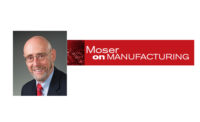AME Issues Plan to Increase US Manufacturing Jobs

Since the end of the Great Recession, U.S. manufacturing jobs increased steadily, from 11.5 million in December 2009 to 12.9 million in November 2019. Then came the COVID-19 pandemic. In just five months, we lost nearly 1.4 million jobs. Fortunately, that trend began reversing in May, and the sector has recovered 623,000 jobs through July. Still, there’s a lot of work to do.
Beyond the economic and job losses, the pandemic exposed our overreliance on imports of medical devices and pharmaceuticals. Clearly, we must think differently about how and where to make our products.
To that end, the Association for Manufacturing Excellence (AME) has published a new report, “A Manufacturing Marshall Plan,” that maps out how manufacturers can prevent post-pandemic supply chain disruptions, boost productivity and reskill their workforces.
The plan advocates for reshoring, near-shoring and what it calls “LeanShoring,” the idea that if manufacturers can reduce costs by just 10 percent through continuous improvement and waste elimination, then 40 percent of what is now offshored could be reshored profitably.
Establishing new domestic supply chains will require manufacturers to increase productivity, speed and quality. All of which can be helped through the digitalization of production. By pairing a connected environment of people, processes and services with the generation of actionable data, manufacturers can realize smart industries that foster innovation and collaboration.
Workers in these smart factories will require digital fluency, technological savvy and data analytics know-how—skills that previous generations did not require and that future generations often lack. Development of a skilled workforce must begin with increasing both the quantity and quality of recruits. Vocational education at the high school level must be revived. The report details how employers, community colleges and other organizations are advancing apprenticeships and work-based learning strategies to close the skills gap.
The pandemic has created a “new normal.” Failure to address the underlying problems in manufacturing will leave us susceptible to future disruptions and economic uncertainty. AME’s “Manufacturing Marshall Plan” provides a solid start to prevent that.
Looking for a reprint of this article?
From high-res PDFs to custom plaques, order your copy today!






